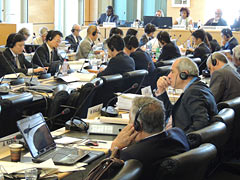The United Nations asks the Japanese government to respect Okinawan people’s opposition against the Henoko relocation plan

August 21, at the Office of the United Nations High Commissioner for Human Rights in Geneva, Switzerland, the United Nations Committee on the Elimination of Racial Discrimination (CERD) commented that Okinawan people's will should be respected regarding U.S. military policies.
August 22, 2014 Tsuyoshi Arakaki of Ryukyu Shimpo
On August 20 and 21, the United Nations Committee on the Elimination of Racial Discrimination (CERD) investigated on racial discrimination in Japan. They also discussed policies on the U.S. military bases in Okinawa. One of the committee members pointed out that it is important to discuss with the local people and get their agreement on the planned construction of a new base in the Henoko district of Nago City for replacement of U.S. Marine Corps Futenma Air Station. Another said that local residents should be involved in the decision making. The committee will announce its final remarks and release an advisory report by the end of the month. One of the committee members stressed that the rights of Okinawan people to access traditional land and resources should be recognized and guaranteed. Another claimed that residents should be included in the decision-making process for policies that might affect their rights. They agreed that there should be local participation at the early stages of decision-making, especially regarding the U.S. military base issues.
Meanwhile at the opening of the meeting, a representative of the Japanese government said, “The residents of Okinawa and natives of Okinawa Prefecture are given and protected by legal equality with Japanese nationals under the Japanese Constitution.” The Japanese government presented their view that the economic gap between the mainland Japan and Okinawa has reduced, and that Okinawa has steadily developed in industry. They expressed respect for the prefecture’s initiative in implementing measures and policies since the Okinawan Promotion Planning policy, previously led by the state, was handed over to the prefecture.
To the Japanese government which does not recognize Okinawan people as “Indigenous People,” one of the committee members pointed out that it is important to consider how people in the Ryukyus identify and define themselves. Another pointed out UNESCO recognizes that Ryukyu/Okinawa has unique language, culture, and tradition and urges the Japanese government to recognize and protect such uniqueness. There have also been many inquiries about policies to protect Ryukyuan languages (Shimakutuba). A representative of the Japanese government asserted, “Those who live in Okinawa Prefecture or natives of Okinawa are not generally considered to be a group of people who share distinct biological or cultural characteristics. Therefore, they are not considered to be the subject of the International Convention on the Elimination of All Forms of Racial Discrimination.”
One of the committee members claimed the Ryukyu Kingdom’s long relationship with Ming and Qing Chinese dynasties, the history of annexation of the Ryukyu Kingdom in 1879 and assimilation policies promoted by the Japanese government all verify the indigeneity of Okinawans. He said it was wrong that Japan does not recognize this. Another said the Japanese government should respect Okinawan people’s will and guarantee their rights in light of this history.
(English translation by T&CT and Megumi Chibana)
Previous Article:Music Village opens in Okinawa City
Next Article:3,600 people gather at protest rally against construction of US air base in Henoko
[Similar Articles]
- Japanese government denies discriminating against the Okinawan people on the Futenma issue
- International NGO visits Henoko and Takae and recommends to appeal on the world stage
- Okinawan lawmaker Itokazu appeals to UN to end Henoko base construction
- Colonialist attitudes behind the ex-US Japan desk diplomat’s derogatory remarks about Okinawans
- Symposium to discuss the significance of Okinawa’s reversion to Japanese sovereignty held in Tokyo
 Webcam(Kokusai Street)
Webcam(Kokusai Street)


